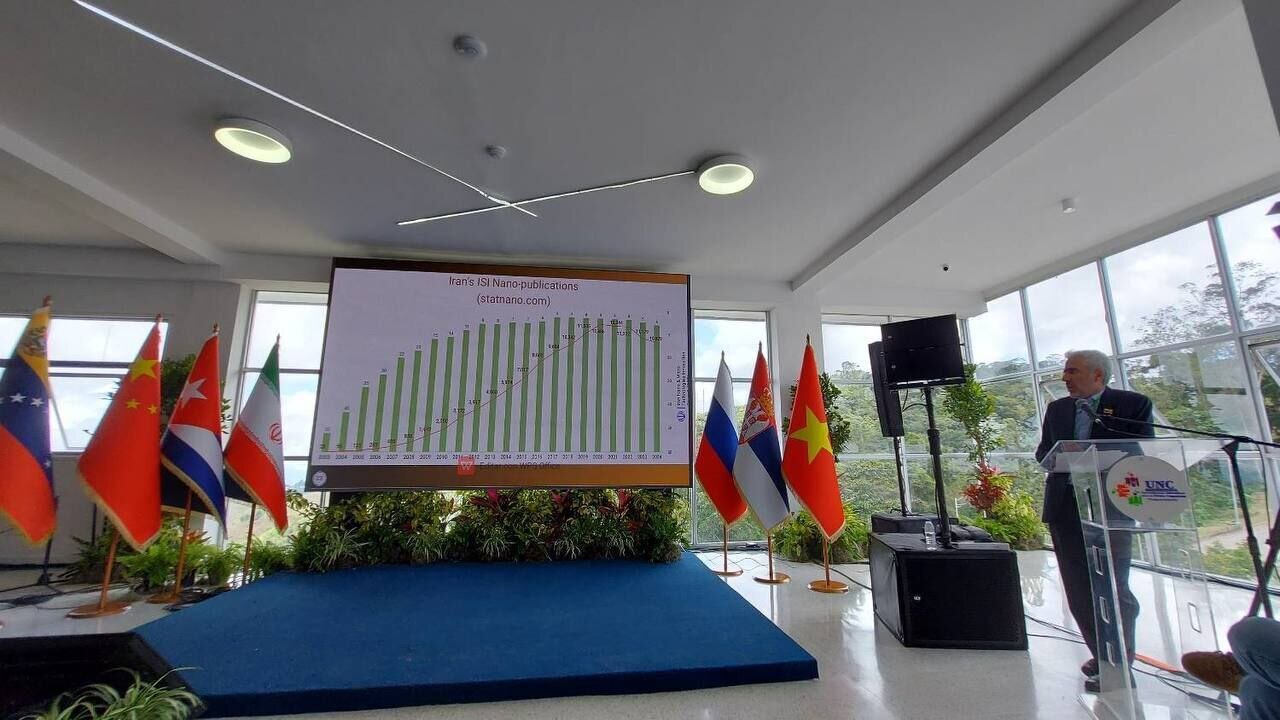Seven countries attend Iran’s nanotech achievements meeting

TEHRAN – During a meeting held in Venezuela on Thursday, high-ranking delegations from Venezuela, Cuba, Russia, Serbia, Honduras, China, and Vietnam gained a deeper understanding of Iran’s achievements in nanotechnology and its applications, particularly in the healthcare sector.
The Venezuelan health minister, vice-president, and academic figures, the Cuban health minister, and the Russian ambassador in Tehran were among the participants.
Elaborating on the country’s road map for the further development of nanotechnology, Emad Ahmadvand, the secretary of the headquarters for the Iran Nanotechnology Initiative Council, highlighted the increase in the number of scientific articles, theses, technological infrastructures, and knowledge-based companies in nanotechnology markets, IRNA reported.
Also, the meeting showcased some Iranian-made products and technologies utilized for the diagnosis and treatment of different illnesses.
Lauding the country’s advancement in nanotechnology, the officials underlined enhancing scientific collaborations, as well as exchanging knowledge and expertise.
Main buyers of Iranian nanotech products
Iran’s investment in nanotechnology research and development has led to the rise of the country as a global leader in nanotechnology, producing and exporting products to different countries across the world.
Access to domestic resources, competitive prices compared to Western countries, and high production of raw nano-materials, nano-catalysts, and advanced equipment, as well as geographical proximity to target markets in neighboring countries, reduced transportation costs, political and trade relations have made Iran a major manufacturer of nanotechnology products in the region and even some global markets.
Iran’s nanotechnology products in various industries are classified into 13 main categories including Civil engineering and construction; Optics, electronics, and photonics; Petroleum and petrochemicals; Pharmaceuticals, health, and well-being; home appliances; Power and energy; Raw materials; Chemicals; Textiles and clothing; Equipment; Automotive industry and transportation; Industrial machinery; Agriculture, animal husbandry, and Water, according to data published by the vice Presidency for Science and Technology.
The construction and civil engineering sector is one of the leading industries in nanotechnology exports, with Iraq and Afghanistan being the two main destinations. Central Asian countries such as Tajikistan, Uzbekistan, and Azerbaijan also import these products.
In the ‘optics, electronics and photonics’ fields, Iraq and Syria are the top importing countries, mainly due to increased insecurities and crises in these countries in recent years.
Nano-scale products include night vision systems, thermal imaging cameras, high-resolution surveillance systems, as well as optoelectronic sensors.
Russia is the only export destination for oil and petrochemical products owing to the Russian oil industry’s dependence on up-to-date technologies, along with Western sanctions.
Syria, Ecuador, Afghanistan, and Turkey are among the main destinations for Iranian pharmaceutical, health, and well-being products. In addition, countries from Asia and Africa to South America also import these products. Iran’s nano-based medicines for the treatment of cancers have been exported to various countries so far. The list of new products, such as nano-supplements, shows that the opportunity for exports in the pharmaceutical and health sector is increasing.
Turkey, Jordan, Iraq, and countries located to the north of Iran, like Armenia and Azerbaijan, are the main importers of Iranian products in the home appliance sector, thanks to the high demand for their antimicrobial or high-resistance properties.
Iran’s nanotechnology products in the power and energy sector are exported to Azerbaijan and Turkey. Given the high capabilities of nanotechnology in improving energy efficiency, it is expected that exports in the field will rise with further investment.
The long-term development plan for the renewable energy project in Azerbaijan includes clear goals for the expansion of solar, wind, and thermal energy. Nanotechnology plays an important role in improving the efficiency of solar panels, anti-reflective coatings, maintaining equipment in harsh climatic conditions, and optimizing energy conversion systems. Iran has been able to meet the needs of Azerbaijan economically.
India, Pakistan, the UAE, and South Africa are interested in purchasing Iran’s raw nano-materials. The export of nanoscale raw materials such as nanoparticles and nanotubes has an attractive market. India and Pakistan, with their extensive manufacturing industries, are important buyers. Due to the development of indigenous technology and access to domestic mineral resources, the cost of producing these materials in Iran is lower than in Western countries and even East Asia.
Countries like India and Pakistan have growing industries, so they need to import nano-materials for the production of industrial paints, advanced materials, cosmetics, nano-medicines, and advanced equipment.
In many industrialized countries, such as the United States and Japan, as well as the European Union, the production of some nanomaterials (particularly metal nanoparticles) is heavily regulated and expensive due to environmental implications. This has led some countries to turn to regional producers such as Iran, which, by adhering to appropriate standards, can provide a stable and quick supply, rather than importing from the West.
Neighboring countries such as Iraq, Afghanistan, Pakistan, Turkey, and Azerbaijan import a big portion of Iranian nanotechnology products because of the low cost of transportation, cultural affinity, and the need for these countries for mid-range technologies. However, some countries such as Syria, Venezuela, Ecuador, and African countries are also on the list of importers. Exports to these countries are likely carried out within the framework of enhancing cooperation.
MT/MG
Leave a Comment